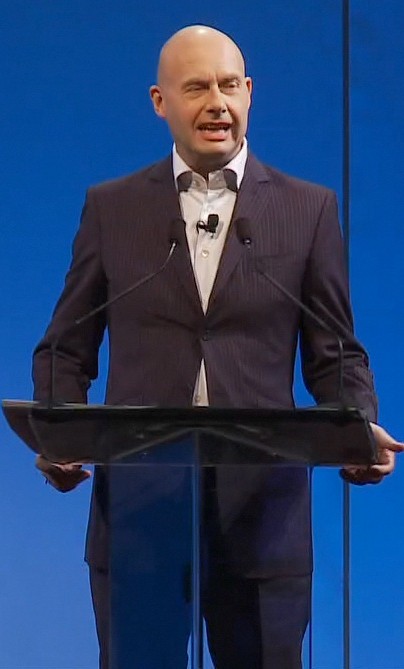January 22, 2014
Fenwick Ousted
DJ Changes Announced - Institutional Strategy To Be Reviewed
Less than two years after his arrival — and just shy of two weeks before News Corp releases its second quarter Fiscal 2014 results — Lex Fenwick has resigned as CEO of Dow Jones and Company, effective immediately, and has left News Corp.
Ex-CEO Lex Fenwick
In a late-Tuesday afternoon press release, News Corp also announced plans to review the media company's "institutional strategy" and named William Lewis as interim CEO.
"We thank Lex for his time and energy at the helm of Dow Jones, and in particular for his original vision of DJX as an innovative way to integrate content and deliver it to customers in a timely manner," News Corp Chief Executive Robert Thomson said in the statement.
"We're reviewing the institutional strategy of Dow Jones with an eye towards changes that will deliver even more value to its customers. As part of that, we're planning improvements to DJX," Thomson said. "We will also be redoubling our efforts to develop The Wall Street Journal and its digital properties globally, which continue to serve the world's most influential readers with the most authoritative news and analysis."
Fenwick presided over a tumultuous period at Dow Jones which saw the departure of over a dozen senior executives and the elimination of popular brands like Smart Money Magazine, all while focusing on beefing up Dow Jones customer service ranks and introducing DJX to a less-than-receptive client base.
In a recent study comparing the "battle" between the New York Times and The Wall Street Journal, media analyst Ken Doctor called Fenwick "an odd choice" for Dow Jones CEO.
"Fenwick is universally described as a man who likes to be the decider, a top-down exec in an age where at least the hint of collaboration is nearly universally espoused," Doctor wrote.
IAPE members who have witnessed bizarre changes ranging from reorganizations of various departments to the elimination of cubicle walls and redecoration of office spaces — with "this is what Lex wants" as a common refrain — became all too familiar with that management style during Fenwick's tenure.
The New York Times citing an unnamed source, reported that "News Corporation's leadership decided that the Dow Jones division needed to change direction," and that Thomson felt the Company "needed to offer more flexibility to customers, and was keen to change course quickly."
Never missing an opportunity to trot out rumors of his controversial past at Bloomberg, Gawker reminded one and all yesterday of one ex-Bloomberg employee's "unhinged resignation letter."
Lewis moves in as interim CEO from his current position as Chief Creative Officer at News Corp, which he has held since February of last year. He previously was the editor of The Daily Telegraph and editor-in-chief of the Telegraph Media Group. In 2010 he became General Manager of News International before joining the News Corp. Management and Standards Commission in February 2011.
More News Coverage:
Quartz says "The chandelier finally fell on Lex Fenwick's tenure at Dow Jones." Late last year, Quartz referred to DJX as "underwhelming" and added that it had "received a lukewarm response" on Wall Street.
Jack Flack parses Robert Thomson's announcement.
Crain's New York thinks "The move was an acknowledgement of the poor reception so far to DJX."
The Associated Press calls yesterday's shakeup "unexpected." A number of IAPE members would disagree.
Firstpost said Fenwick's resignation was "an abrupt departure that calls into question the future of its news wires and other products aimed at financial institutions." They also noted the cosmetic changes implemented during Fenwick's tenure, including "pricey espresso machines that one person familiar with the matter said cost about $30,000."
ValueWalk, like many others, believes Fenwick's exit was "more about results than personality."
The Street believes, now that Fenwick is gone, Thomson is the one left on the hot seat at News Corp. "Thomson must now decide whether to even retain DJX or concentrate on the company's flagship property, The Wall Street Journal, similar to how New York Times Co. sold the Boston Globe and other properties to focus on its foremost news organization," the business website says. "The News Corp. chief executive, who is running a company for his first time, must also decide what to do with two high-profile but money-losing operations, the New York Post and Times of London."
Twitter users, as they often are, were more blunt with their assessments:
"Dow Jones CEO Lex Fenwick fired from a non-job job, replaced by Will Lewis, who leaves current non-job job for a higher level non-job job," wrote Vanity Fair's Michael Wolff.
WSJ and MarketWatch columnist Brett Arends offered his take on the matter: "Lex Fenwick, who axed successful Smart Money magazine rather than hire ad staff, leaves."
Journalist Elizabeth Lumley wondered, "Will he have to pawn his Ozwald Boateng suits?"
CNN's Evan Perez offered this wish for his former WSJ colleagues in Washington: "may the bloombergization end, bring back desk space."
WSJ Mansion reporter Sanette Tanaka reassures us all: "What I learned at work yesterday: Our CEO Lex Fenwick is leaving, but the coffee bars are staying."
And, of course, we at IAPE wonder if anybody knows Lewis's thoughts on interior design.

